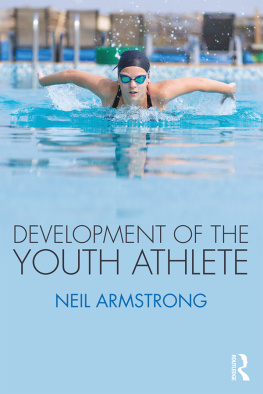This book is dedicated to Annabelle Ewa Hill who arrived on the 1st November, 2015.
THE PSYCHOLOGY OF PERFECTIONISM IN SPORT, DANCE AND EXERCISE
Perfectionism has been found to play an important yet complex role in sport, dance, and exercise.
This collection provides a comprehensive and up-to-date account of theory, measurement, research findings, and practitioner issues associated with perfectionism, providing readers with insights into both its benefits and its costs. The book features contributions from many of the leading researchers in the field, and also includes recommendations from experienced practitioners and clinicians on how best to work with perfectionists.
This book will provide students and researchers in sport and exercise psychology, as well as coaches and instructors in sport, dance, and exercise, with an invaluable resource to guide their research and practice.
Andrew P. Hill is an Associate Professor at York St John University, UK. He has produced over 40 publications on the topic of perfectionism in sport, dance, and exercise. He is a former Associate Editor of the International Journal of Sport Psychology and current Senior Section Editor of the Scandinavian Journal of Medicine and Science in Sport. He is also a member of the editorial boards of the Journal of Sport and Exercise Psychology and Sport, Exercise, and Performance Psychology.
First published 2016
by Routledge
2 Park Square, Milton Park, Abingdon, Oxon OX14 4RN
and by Routledge
711 Third Avenue, New York, NY 10017
Routledge is an imprint of the Taylor & Francis Group, an informa business
2016 selection and editorial matter, Andrew P. Hill; individual chapters, the contributors
The right of the editor to be identified as the author of the editorial material, and of the authors for their individual chapters, has been asserted in accordance with sections 77 and 78 of the Copyright, Designs and Patents Act 1988.
All rights reserved. No part of this book may be reprinted or reproduced or utilised in any form or by any electronic, mechanical, or other means, now known or hereafter invented, including photocopying and recording, or in any information storage or retrieval system, without permission in writing from the publishers.
Trademark notice: Product or corporate names may be trademarks or registered trademarks, and are used only for identification and explanation without intent to infringe.
British Library Cataloguing in Publication Data
A catalogue record for this book is available from the British Library
Library of Congress Cataloging-in-Publication Data
Names: Hill, Andrew (Sports psychologist), editor.
Title: The psychology of perfectionism in sport, dance and exercise / edited by Andrew P. Hill.
Description: Abingdon, Oxon; New York, NY: Routledge, 2016.
Identifiers: LCCN 2015045223 | ISBN 9781138958685 (hardback: alk. paper) | ISBN 9781138958692 (pbk.: alk. paper) | ISBN 9781315661100 (e-book)
Subjects: LCSH: SportsPsychological aspects. | Perfectionism (Personality trait)
Classification: LCC GV706.4 .P7845 2016 | DDC 796.01/9dc23
LC record available at http://lccn.loc.gov/2015045223
ISBN: 978-1-138-95868-5 (hbk)
ISBN: 978-1-138-95869-2 (pbk)
ISBN: 978-1-315-66110-0 (ebk)
Typeset in Bembo
by codeMantra
Frank Abrahamsen, PhD, Norwegian School of Sport Science, Oslo, Norway
Paul R. Appleton, PhD, School of Sport, Exercise and Rehabilitation Sciences, University of Birmingham, Birmingham, UK
Thomas Curran, PhD, Department for Health, University of Bath, Bath, UK
Patrick Gaudreau, PhD, School of Psychology, University of Ottawa, Ottawa, Ontario, Canada
John K. Gotwals, PhD, School of Kinesiology, Lakehead University, Thunder Bay, Ontario, Canada
Henrik Gustafsson, PhD, Faculty of Health, Science and Technology, Karlstad University, Karlstad, Sweden, and Swedish Olympic Committee, Stockholm, Sweden
Howard K. Hall, PhD, Faculty of Health and Life Sciences, York St John University, York, UK
Paul L. Hewitt, PhD, Department of Psychology, University of British Columbia, Vancouver, British Columbia, Canada
Andrew P. Hill, PhD, Department of Psychology and Sport, York St John University, York, UK
Gordon L. Flett, PhD, Department of Psychology, York University, Toronto, Ontario, Canada
Gareth E. Jowett, PhD, Department of Applied Human Sciences, York St John University, York, UK
Dayna Lee-Baggley, PhD, QEII Health Sciences Centre, Halifax, Nova Scotia, Canada
Carolina Lundqvist, PhD, Faculty of Health, Science and Technology, Karlstad University, Sweden, and Swedish Olympic Committee, Stockholm, Sweden
Daniel J. Madigan, MSc, School of Sport & Exercise Sciences, University of Kent, Kent, UK
Sarah H. Mallinson, PhD, Department of Psychology and Sport, York St John University, York, UK
Logan Nealis, PhD, Department of Psychology, Dalhousie University, Halifax, Nova Scotia, Canada
Sanna M. Nordin-Bates, PhD, Swedish School of Sport and Health Sciences, Stockholm, Sweden
Simon B. Sherry, PhD, Department of Psychology, Dalhousie University, Halifax, Nova Scotia, Canada
Joachim Stoeber, PhD, School of Psychology, University of Kent, Kent, UK
The ideas that perfect practice, perfect performance, and flawlessness are desirable have strong resonance in sport, dance, and exercise. In sport and dance, this may be because the margins between success and failure are often extremely small. Contests can be won or lost by one hundredth of a second, a centimeter or two, and a single mistimed movement or misplaced limb. In other words, near perfect performance can be necessary for success in these domains. This is obviously not the case in an exercise domain. However, in an exercise domain the pressure of direct competition is replaced by a more insidious pressure to conform to perfectionistic body ideals and the unrealistic images of perfection that are valued in modern society. For these reasons, perhaps more so than in other domains, the pursuit of perfection is legitimatized, encouraged, and even revered in sport, dance, and exercise.
This is the first book dedicated to scientific research that has examined the effects of pursuing perfection in sport, dance, and exercise. The aim of the book is to provide a comprehensive account of current theory, measurement, research findings, and practitioner issues associated with perfectionism in these domains. To this end, the book includes contributions from colleagues who have provided much of the research on which our current knowledge regarding perfectionism in these domains stands. Thanks to the quality of the contributions made by these colleagues, there is currently no better starting place than this book for those wanting to learn about perfectionism in sport, dance, and exercise.
Organization of the book
Part I: Conceptual, measurement, and development issues
The book is organized into four parts. The first part includes three chapters that address conceptual, measurement, and development issues. These are key chapters in terms of gaining a sound footing in this area and will serve readers well in subsequent chapters.
In the first chapter I provide a conceptual overview of perfectionism. This includes a description of early unidimensional perspectives and current multidimensional models. Three commonly adopted multidimensional models are described. One of these models, the hierarchical model, is offered as a heuristic to understand perfectionism research in sport, dance, and exercise. The hierarchical model distinguishes between two broad dimensions of perfectionism, perfectionistic strivings and perfectionistic concerns. A number of ongoing debates and issues are also described. These include the relevance of perfectionism beyond a clinical context, whether perfectionism is unidimensional or multidimensional, a trait or disposition, and can be found in a normal, healthy, or adaptive form. While not resolved here, these issues are reconciled in a manner that equip readers to better navigate them as they find them in research in this area and subsequent chapters of this book.
Next page








